Flying high - a chat with Julia Sebestyen
by Adastra
Photos © Absolute Skating
Few lady skaters can
jump as far up in the air as Julia Sebestyen, 24. She's
the 4-time Hungarian National champion and 2004 winner
of the European Championships. Her season started well
when she won bronze at both Trophy Eric Bompard and
Cup of Russia. She's a busy person but Absolute Skating
managed to get an interview before she left for Moscow
to compete with the
|
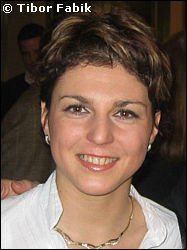 |
How did you get into skating?
I started skating when I was 3, at an open-air ice
rink in Tiszaújváros, my parents took me there.
At the age of 13 I moved to Budapest, alone. In the capital
city I was able to train under better conditions. At first
I stayed with Klári Kozák, who was my coach
at the time, I have a lot to thank her for.
Who are your favourite skaters?
Nancy Kerrigan and Kristi Yamaguchi, because they
skated with so much grace. And Midori Ito because of her jumps,
she was a really gifted jumper. She was the first woman to
land a triple Axel in an international competition.
What do you prefer in your programs:
technical elements or linking movements? What are your favourite
figure skating elements?
I like the whole program, all jumps, spins and footwork. Since
jumps are the most dominant elements, my favourite one is
the triple Lutz. I was the first Hungarian woman figure skater
who landed it in a competition, and I was only 13 then.
How do you prepare yourself for a new program?
For example how do you choose the music? And who creates your
beautiful and elegant costumes? Do you have a say in that
matter?
In the last couple of years, recognized choreographers
like Nina Petrenko, Nikolai Morozov, Tatiana Tarasova and
Evgeni Platov, have put my programs together. They also chose
the music and I think they succeeded in picking the right
music for my personality. These people know me and my capacity
well and know what suits me. My costumes are created overseas.
The makers show me the plans beforehand so I can choose what
I like the best. I might have a say in picking the colours
of the costume, but the makers know what kind of dresses will
suit me and can emphasize my strong points.
What do you think figure skating is: art or sport?
Mainly sport, but a rather complex one because you
have to be athletic and flexible at the same time. You need
to be in great shape, yet you have to pay attention to all
the details of a performance. You have to cope with the expectations
alone.
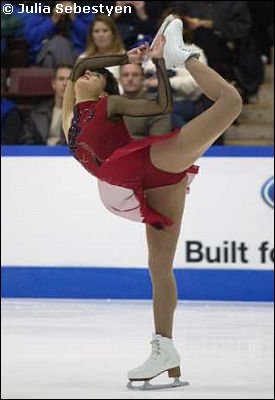
Are you friends with other international skaters?
I am on friendly terms with a lot of skaters, because
we have been competing together for some years now, we attend
the same training camp, etc.
Tell us about your coaches András Száraz
and Eszter Jurek!
I like working with them very much, they know all
about my jumps and I’m practically able to read their
minds as far as what they want me to pay attention to.
If there's a problem, we're able to discuss it and try to
correct it; we always strive for better achievements.
Which one of you is the most nervous during a competition?
Probably András :))) because he cannot do anything
to help during the performance, all he can do is watch and
worry.
Last season Budapest hosted a quite successful European
Championships. Thanks to the enthusiastic crowd foreign visitors
came to the conclusion that figure skating is a pretty popular
sport in Hungary. What is your opinion on this?
In Zsuzsa Almássy's time it was really popular.
Families were watching figure skating competitions and cheering
together. The European Championships in Budapest last year
proved that people still willingly come to watch and cheer
for Hungarian athletes. Since the Europeans, the interest
in skating has definitely increased, and more and more people
turn their attention to figure skating competitions.
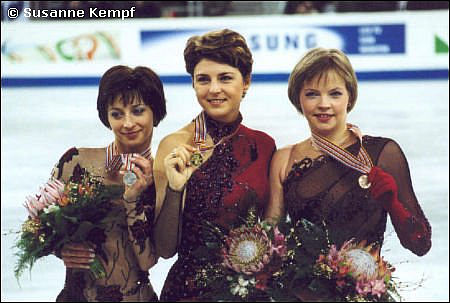
Winning her European title in Budapest, 2004
How would you describe your training?
We've been training in the Jégcsarnok rink
(in Budapest) for the past 4 years. Before that we had to
train in a temporary tent put over the open-air icerink of
Városliget (also in Budapest) for 2 years, because
the Budapest Sportcsarnok (a stadium with training facilities)
had burned down. Moreover, we had to travel day after day
to Székesfehérvár and Dunaújváros
to train (respectively 75 and 70 km from Budapest).
It was a very tough period. We had to compete with foreign
skaters who had had better training conditions than ours.
But that's probably encouraged us to work even harder. I have
off-ice training, and ballet two times a week. I jog every
day to better my physical condition. During the summer I do
some different kinds of off-ice training as well, but that's
only during the off-season. I sometimes do aerobics, also
for physical condition.
What do you think your strength and weaknesses as
a figure skater are?
For a long time I was Juli Sebestyén, the
skater with the high jumps. Right now I'm working hard to
improve my artistry.
How do you manage that marvellous spring in your
jumps?
Everybody's asking me that! (She smiles) I would
say talent, but good technique is just as important.
What are your goals for next season?
I'm always concentrating on the tasks ahead, and
try to do my best. I never think in terms of placements, because
results depend on lots of things: luck, good draw, opinion
of judges...
How do you prepare yourself for the World Championships?
I'm going to a training camp in Landskrona, Sweden,
before the Worlds. There I can be completely alone on the
ice. I listen to my music a lot, it's calm and I train hard.
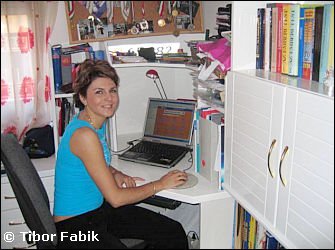 |
Beside skating you're also a
student? |
What about your family, do they attend competitions?
My parents still live in Tiszaújváros.
I have a younger brother; he's a sophomore at the Budapest
University of Technology and Economics, Faculty of Electrical
Engineering. I rarely have the time to go home, so often my
family visits me. If a competition takes place in Hungary
or in a neighbouring country, they will come and watch me,
along with my two cousins, Ági and Évi, and
my godparents. All my biggest fans!
What are your hobbies?
Reading, listening to music, going to cinemas. During
the off-season I have more time, so then I go out with friends
and my cousins.
What, in your opinion, are the most important qualities
in an athlete that can bring her/him to the top?
Persistence, diligence, strong will, endurance of
pain, failure but success as well.
How do you react to criticism or praise?
I can accept criticism, because that's what makes you develop,
and of course one is pleased with the praise, only you have
to consider if it’s genuine or not.
Do you carry any lucky charms? |
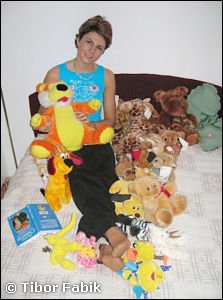
Julia with her plush toys from Euros |
Are you comfortable with people recognizing you
on the street?
I’ve had to get used to it, cause nowadays
it happens a lot. Some ask for autographs or tell me that
they're cheering for me, and that's really flattering!
Do you follow fashion trends?
Only if they suit me, and that doesn't always mean
the newest trends.
Where is your favourite place in the world?
My favourite place is Tiszaújváros.
I also like Vancouver, Paris and Brisbane in Australia; I've
already been there. Unfortunately there isn’t much time
for sightseeing during competitions.
What do you think of Sweden?
I train in a small town in Southern Sweden called
Landskrona, and people are very friendly there. They're pretty
calm; they don't worry all the time like we do.
Finally, what kind of boots and blades do you use?
Boots: Risport RF2 SUPER.
Blades: Wilson Gold Seal.
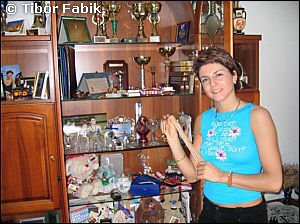 Julia shows her trophy collection |
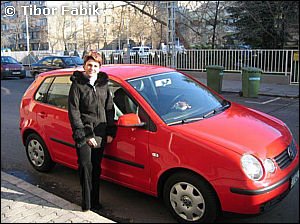 Julia with her car |
Copyright © 2004 - 2025, Absolute Skating
All rights reserved.



